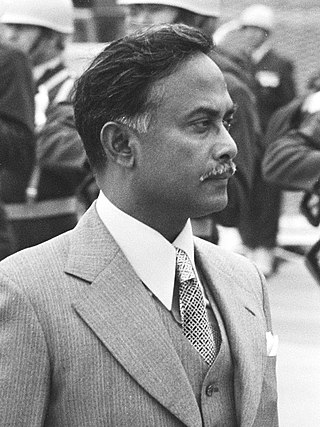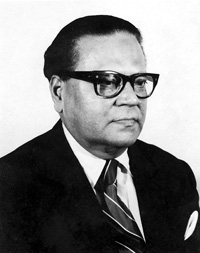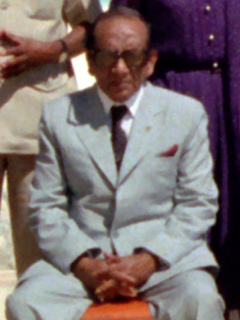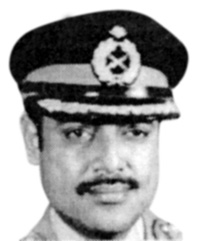
Ziaur RahmanBU HJ HOR was a Bangladeshi military officer, freedom fighter and politician who served as the sixth President of Bangladesh from 1977 until his assassination in 1981. One of the leading figures of country's Liberation War, he broadcast the Bangladeshi declaration of independence on 27 March 1971 from Chittagong. He was the founder of Bangladesh Nationalist Party (BNP). He previously served as the third chief of army staff from 1975 to 1978 with a minor break.

The Bangladesh Nationalist Party is a major political party in Bangladesh. Founded on 1 September 1978 by Bangladeshi president Ziaur Rahman with a view of uniting people with a nationalist ideology, BNP later became one of the two dominant parties in Bangladesh, along with its archrival Awami League. Initially a big tent centrist party, it later moved towards more right-wing politics.

Hussain Muhammad Ershad was a Bangladeshi military officer and politician who served as the president of Bangladesh from 1982 to 1990.

Abul Fazal Mohammad Ahsanuddin Chowdhury was a Bengali public servant and judge who served as President of Bangladesh from 27 March 1982 to 10 December 1983.

Abdus Sattar was a Bangladeshi statesman. A leader of the Bangladesh Nationalist Party (BNP), he served as the president of Bangladesh from 1981 to 1982, and earlier as the vice president. A jurist by profession, Abdus Sattar held numerous constitutional and political offices in British India, East Pakistan and Bangladesh. He was a cabinet minister, supreme court judge, and chief election commissioner. He took oath and became president shortly after the assassination of president Ziaur Rahman.

Shah Azizur Rahman was a Bangladeshi politician who served as the prime minister of Bangladesh. However, he was the subject of considerable controversy for his collaboration with the Pakistan Army against the struggle for the independence of Bangladesh.

The Jatiya Party (Bengali: জাতীয় পার্টি, romanized: Jatiyo Party, lit. 'National Party'; JaPa or JP(E)) is a political party in Bangladesh. The current chairman of the party is Ghulam Muhammed Quader. On 3 January 2019, the party announced its decision to join the Bangladesh Awami League-led Grand Alliance after having been in opposition for the previous parliamentary term. However, the party backtracked the next day and announced that it intended to remain part of the opposition.
Mohammad Ataul Gani Osmani was a Bangladeshi military officer and revolutionary. His military career spanned three decades, beginning with his service in the British Indian Army in 1939. He fought in the Burma Campaign during World War II, and after the partition of India in 1947, he joined the Pakistan Army and served in the East Bengal Regiment, retiring as a colonel in 1967. Osmani joined the Provisional Government of Bangladesh in 1971 as the commander-in-chief of the nascent Bangladesh Forces. Regarded as the founder of the Bangladesh Armed Forces, Osmani retired as the first full general from the Bangladesh Army in 1972.

Khaled Mosharraf BU was a Major General in Bangladeshi army who is known for his role in the Bangladesh Liberation War and the subsequent coups in post-independence Bangladesh. After deposing Khondakar Mustaq Ahmad in the 3 November 1975 coup, Mosharraf was assassinated on 7 November 1975.

Bangladesh has undergone several changes of government since the Proclamation of Independence in 1971. Between the first recorded uprising in August 1975 and the 2009 Bangladesh Rifles revolt, Bangladesh has been through as many as 29 military coups.

Sayed Farooq Rahman was the chief organizer involved in toppling the Sheikh Mujib regime in Bangladesh. He was convicted and hanged on 28 January 2010 along with co-conspirators Sultan Shahriar Rashid Khan, A.K.M. Mohiuddin Ahmed, Mohiuddin Ahmed, and Mohammad Bazlul Huda in Dhaka Central Jail, Old Dhaka, for the murder of Sheikh Mujibur Rahman, the founding father and the first president of Bangladesh. Sayed Farooq Rahman and his close ally Khondaker Abdur Rashid were the chief organisers of the assassination of Sheikh Mujibur Rahman on 15 August 1975. He was 2IC of the 1st Bengal Lancers Regiment of the Bangladesh Army who led a group of junior army officers in order to overthrow the regime of Sheikh Mujib and install Khondaker Mushtaque Ahmed as president of Bangladesh.
Muhammed Abul ManzurBU was a Bangladeshi military officer who commanded the Bangladesh Forces operations in Sector 8 during the Bangladesh Liberation War against Pakistan in 1971. He was allegedly involved in the assassination of the then-president of Bangladesh, Ziaur Rahman. The erstwhile chief of army staff and alleged mastermind of Rahman's assassination, Hussain Muhammad Ershad, had put a standing shoot-to-kill order on Manzur's life—he was killed shortly after being captured at the border. About a year later, Ershad initiated a bloodless coup d'état and took over the central government, holding power until 1990.

Ataur Rahman Khan was a Bangladeshi lawyer, politician and writer, who served as the chief minister of East Pakistan from 1 September 1956 – March 1958, and as the prime minister of Bangladesh from 30 March 1984 to 1 January 1985.

Z Force, also known as the Tura Brigade, was the first military brigade of Bangladesh Forces, formed during the Liberation War of Bangladesh in 1971 under Major Ziaur Rahman along with the consent of the revolutionary government of Bangladesh in exile. The brigade was formed with the 1st, 3rd and 8th Battalion of East Bengal Regiment on 7 July 1971. It is the first ever complete brigade formed during the Liberation War of Bangladesh in 1971.
S Force was a military brigade of the Bangladesh Armed Forces that was formed under the leadership of Major K M Shafiullah on October 1, 1971. The brigade was composed of the 2nd and 11th East Bengal Regiment.

Amin Ahmed Chowdhury was a Bangladeshi army officer and diplomat.

Abdul Haleem Chowdhury was a politician of the Bangladesh Nationalist Party, Member of Parliament, and government minister. He is a retired captain of Pakistan Army and fought in the Bangladesh Liberation War and established Halim Bahini. His son-in-law is Mafizul Islam Khan Kamal.
Mohabbat Jan Chowdhury is a former Bangladeshi Army Major General, politician and former Home Minister. He served as the Director General of DGFI.
Mohammad Ziauddin, BU is a retired Bangladeshi military officer, who was the Commanding Officer of the 1st East Bengal Regiment during the Bangladesh Liberation War. He was awarded the Bir Uttom, the country's second highest gallantry award for his outstanding bravery in the Liberation War. His certificate number was 22.













